Simon de Montfort
Simon de Montfort was a French noble who became chief advisor to King Henry III and was instrumental in forming England's first Parliament. 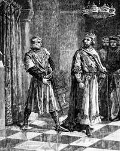
Montfort was born in Normandy, in France in 1208, the fourth son of Simon de Montfort IV and Alice de Montmorency. His rich father left all of his land to his oldest son, Amaury. Simon decided to go to England, to retry to reclaim his family's lands there. (King John had seized the land in 1210.) Montfort arrived in England in 1230, and he and the king, Henry III, quickly got along. Thanks in part to effort's by Simon's cousin Ranul, earl of Chester, Henry agreed to give Simon back his family's lands, naming him the 6th Earl of Leicester, and later gave him Kenilworth Castle as a headquarters. Simon came to be one of Henry's most trusted advisors. Montfort married Henry's sister Eleanor, and this strengthened the ties between the two men. Simon and Eleanor eventually found five children: Guy, Henry, Amaury, Simon, and Eleanor. 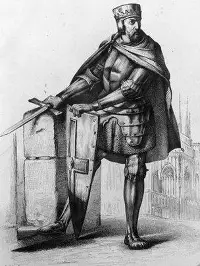
A dispute over money between Henry and Simon forced the latter to flee England for France. Then, Simon, following his father's footsteps, joined the Crusades in 1239 and returned three years later. He later ruled Gascony in Henry's stead (gaining a reputation as a ruthless leader) and led a few diplomatic missions on Henry's behalf to Italy and Scotland. Henry, whose father, John, had signed Magna Carta and then repudiated it, angering his barons and starting a war, did the same thing, acting more and more like an absolute monarch and angering his barons to the extent that one of them delivered an ultimatum that Henry interpreted as a threat of civil war and agreed to an agreement known as the Provisions of Oxford. Among the terms of that agreement was the promise that Henry would form a council of 15 barons and consult them on matters of state. Montfort was one of those 15 barons. Henry tired of seeking his council's advice and dismissed them in 1261, reasserting personal rule. This was not a popular move with many people. Montfort at first left the country but, at the behest of other barons, returned, in 1263. 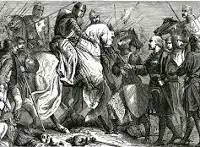
By 1264, the barons had had enough and decided to revolt. The Second Barons War began. (The First Barons War was a struggle between nobles and King John, after John renounced Magna Carta.) By this time, Simon de Montfort had become disillusioned with Henry III. It was de Montfort who led an armed rebellion against the king. The two sides met in a fierce battle near the town of Lewes in 1264. The forces of de Montfort were victorious, even capturing Henry and his son, Edward. The victorious barons forced Henry to relinquish much of his power; after this, Montfort took on all the trappings of a monarch for a time. 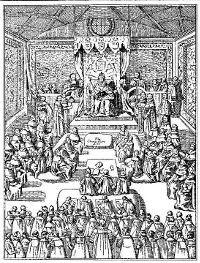
Acting in the king's name but with a purpose all his own, de Montfort issued a call for a Parliament. Unlike the Witans of old, however, which were made up of only nobles, this gathering was to include commoners as well. Also, Montfort called for men to come from many major cities, not just a few select places. The Parliament first met on January 20, 1265, at the Palace of Westminster in London. Henry III was in attendance. The Parliament met off and on for another few months, then dispersed. It was not until long after that the idea of a Parliament meeting regularly in session as put into practice. Montfort, nominally in control of the government, could not escape the trappings of power that had held John and Henry enthralled and soon ruled as something like a modern military dictator. Like Henry, he detested Jews and went to great lengths to expel them from the country. He ended up alienating many of his strongest supporters, including Gilbert de Clare, the earl of Gloucester, who had fought at his side in the victory over Henry and William at Lewes. 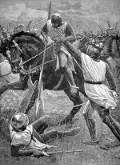
Henry's oldest son, Edward, escaped the house arrest (with Gloucester's help) under which he and his father had been placed after their defeat at the Battle of Lewes. Edward set about rallying forces loyal to the king, and royal army squared off against rebel army at the Battle of Evesham, on Aug. 4, 1265. Montfort had gained the support of Welsh infantry, but that force deserted early on in the battle. Montfort was also missing the support of his son Simon, who had been detained, along with a number of reinforcements. Montfort, outnumbered fought on. Edward proved the better commander and Montfort was killed. The victorious soldiers badly mutilated his body, and his remains were taken to Evesham Abbey. |
|
Social Studies for Kids
copyright 2002–2026
David White




